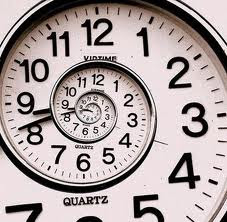Monday, April 2, 2012
Eternal Now—Meister Eckhart
Sitting Around Campfire Discussing Meister Eckhart
Meister Eckhart Conversation Continues
July, ‘82
Meister Eckhart sermonized during the "age of knighthood," or the
time when armor-clad roustabouts respected chivalry and honor more
than they did the heads they lopped off during a joust. When I asked
Bill, "How could that be, how could a catholic theologian, a foot
soldier in the Pope's army, reject God and get away with it?" He said,
"he didn't; Eckhart was put on trial for heresy in 1326, and he died
during the proceedings." The rest of the conversation went something
like this:
"That figures," I said, "Anyone who dared turn the Christian view of
creation into an argument for continuous creativity had to be a threat
to the church. What I don't understand, though, is how he reconciled
his belief in the Trinity with continuous creation, and where did the
double negatives fit in?"
"Yes, that was a problem," Bill responded, "but only if the Father,
Son, and Holy Spirit are conceived as separate from God. Of course,
the Persons of the Trinity are both separate from, and one with God.
That is the Christian paradox isn't it! It was Eckhart's `eternal now'
concept that solved the problem. In the `eternal now,' the Persons of the
Trinity became one with the creative process as they affirmed God.
They became a necessary and integral part of transcendent God as they
permitted God's immanence in the `here and now.' For the Meister, the
Son and the Holy Spirit made possible both creation and creativity."
"They substituted for the double negative aspect of God then?" I said.
"If I understand you correctly," replied Bill, "yes. From a functional
perspective, your double negative and Eckhart's Trinity are
interchangeable concepts. Were it not for the Trinity there wouldn't
be a God and, according to Eckhart, we wouldn't be having this
conversation! The Godhead, which is the affirmative ground of God, is
indescribable, but creation—past, present, and future—is the
manifestation of the Persons of the Trinity. In the language of the
`eternal now,' we are speaking of God as simultaneously immanent in
creatures, as He is also transcendent to them."
"Without the Persons of the Trinity," I said, "there wouldn't be a
`now,' eternal or otherwise?"
"You bet," said Bill, "for Eckhart, the Trinity and God are the same
thing. And because of that, he sometimes referred to God as pure
intellect or understanding."
"God is limited by reason then?"
"I wouldn't put it like that," Bill replied. "The divine addresses
what is; it does not limit possibility."
"But what about miracles?" I said. "What about Jesus? He was, at
least according to scripture, immaculately conceived."
"The Bible tells us that God's Son was made flesh," Bill replied.
"What the church understands as flesh and blood might, given some of
Eckhart's statements, be better understood as a symbolic
representation for all Sons and Daughters of God—the human race.
Subscribe to:
Post Comments (Atom)






No comments:
Post a Comment